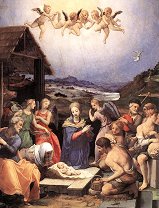Catholic Activity: Crib of St. Francis

Description of how St. Francis created a different crib scene.
DIRECTIONS
With St. Francis we come to a turning point in Crib history. Popular opinion is just as mistaken in thinking that he originated the custom of the Crib as it is in ascribing almost exclusively to him an attitude of tender compassion toward animals. Early Christian literature is full of tales illustrating the intimacy of saints and beasts; and in his youth Francis surely saw Nativity dramas and the then familiar iconography of the Nativity. His extraordinary originality lay in being able to transform and renew whatever he touched and to impress upon it forever the stamp of his unsullied genius and love.
Francis must often have prayed in the Praesepe chapels in Rome, and when he visited the Holy Places in 1220 something of himself will have remained there, but something of their spirit returned with him. For Francis Christmas had always been the "feast of feasts" bringing light and hope into a dark world, the day when "heaven and earth are made one" and "God condescended to be fed by human love." If Christmas fell on a Friday he swept aside fasting, wishing to see even "the walls rubbed with fat," every poor man entertained by the richer, and double rations given to every animal, but especially to all oxen and asses. Could he but have spoken to the Emperor the first favour he would have begged would have been a decree ordering corn to be scattered on the roads so that all birds, "but especially our sisters the larks," should also feast.
The idea of celebrating the feast in a special way seems to have occurred to him suddenly in the Advent of 1223. He was in Rome and before leaving he asked the Pope's permission to keep Christmas in his own way so as to realize outwardly the poverty of Christ in the manger.
He sent for his friend Giovanni Vellita, a landowner of Greccio where Francis had a favourite hermitage. "If now it seems good to thee that we should celebrate this feast together, go before me to Greccio and prepare everything as I tell thee. I desire to represent the birth of that Child in Bethlehem in such a way that with our bodily eyes we may see what He suffered for lack of the necessities of a newborn Babe and how He lay in manger between the ox and ass."
Giovanni hastened to obey, and, says St. Bonaventure: "Many brothers and good people came at Francis' bidding, and during the night the weather also was beautiful. Many lights were kindled, songs and hymns were sung with great solemnity so that the whole wood echoed with the sound, and the man of God stood by the manger, filled with the utmost joy and shedding tears of devotion and compassion. By his order the manger had been so arranged that Mass was celebrated on it, and blessed Francis, the Levite of Christ, sang the Gospel and preached to the people on the Nativity of Christ our King, and whenever he pronounced His name with infinite tenderness he called Him the "little Babe of Bethlehem." St. Bonaventure, who certainly must have had the account from an eyewitness, goes on to tell of the vision of Giovanni who saw a Babe, seemingly lifeless in the manger until the Saint awoke Him out of sleep; and he comments: "nor was this vision untrue, for by the grace of God through His servant blessed Francis, Christ was awakened in many hearts where formerly He slept."
St. Francis' other biographer, Thomas of Celano, tells how "Greccio was transformed into a second Bethlehem, and that wonderful night seemed like fullest day to both man and beast for the joy they felt at the renewing of the mystery." He emphasizes the unusual consolation felt by the officiating priest, and the strong, sweet, clear voice of Francis as he read the Gospel and preached "saying all manner of tender things on the birth of the Poor King in Little Bethlehem. Repeatedly whenever he wished to name Jesus Christ, inflamed with immense love he called Him Babe of Bethlehem pronouncing the words almost like the bleating of a sheep, and his mouth seemed full, not only of his voice, but with emotion for when he named Jesus or Babe of Bethlehem, he licked his lips as though to taste the full sweetness of the words." Only an eyewitness could have given Thomas that detail.
This, then, was Francis' Nativity celebration; it had no connection with the Nativity Dramas in that he did not impersonate anyone, nor did the priest or brothers. There were neither the traditional figures nor dialogues, and there may or may not have been a figure in the manger. Nevertheless the Nativity of Our Lord was realized that night as fully as perhaps it ever can be. The love, the devotion, the concentration of each individual became one with that of Francis, and in Sabatier's words: "he was no longer in Greccio; his heart was in Bethlehem."
Activity Source: Christmas Crib, The by Nesta de Robeck, The Bruce Publishing Company, Milwaukee, 1956







